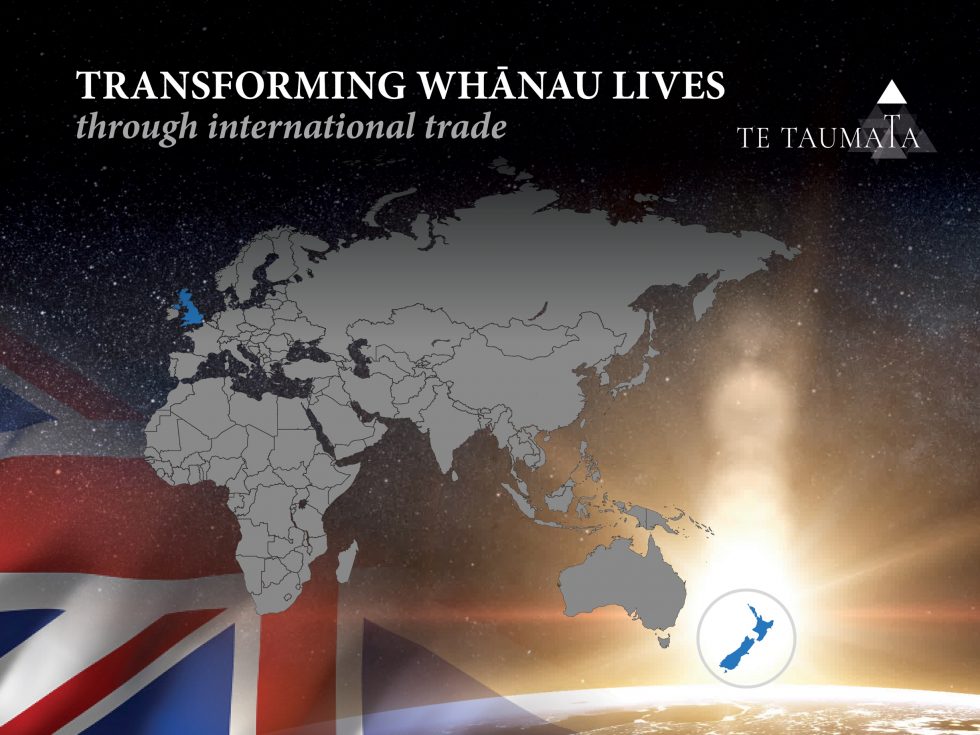This is the second in a series of pānui looking at the NZ/UK Free Trade Agreement (FTA) and the benefits it presents for Māori.
The agreement, which was officially signed in London earlier this month, contains the broadest set of outcomes for Māori that Aotearoa has negotiated in any FTA.
It recognises Māori trade and economic interests and priorities in the UK market, and the unique relationship with the British Crown as original signatories to Te Tiriti o Waitangi.
Our first pānui focused on the improvements to goods market access and the sectors that will see the biggest impact. If you missed the first issue, you can check it out here.
Today, Te Taumata will look at the FTA’s specific provisions for Intellectual Property (IP) and the Māori Trade and Economic Co-operation chapter.
Intellectual Property
Under the new FTA, copyright in Aotearoa will be increased to 70 years after the life of the creator. This brings Aotearoa in line with the UK, USA, Australia, and EU.
Aotearoa has also agreed to introduce a resale rights scheme for artists, which will allow them to receive royalty payments from their work in the same way as authors, songwriters and composers.
Māori are renowned for our art and performance. Te Taumata considers this copyright increase an important step in protecting our IP and ensuring our people reap the benefits of our creations.
The NZ/UK FTA also stipulates that both countries will co-operate at the World Intellectual Property Organisation (WIPO) Intergovernmental Committee on Genetic Resources, Traditional Knowledge and Folklore (IGC) to work towards a multilateral outcome.
The chapter on IP specifically states Māori will be included in any IP discussions relating to matters of interest to Māori, and issues relating to genetic resources, traditional knowledge, and traditional cultural expressions.

Māori Trade and Economic Co-operation chapter
The FTA contains a dedicated Māori trade and economic co-operation chapter, recognising the value of increased Māori participation in international trade and investment.
It promotes co-operation between countries to enable and advance Māori economic and wellbeing aspirations, such as enhancing the ability of Māori-owned enterprises to access and benefit from the trade and investment opportunities created under the FTA.
It recognises the value of Māori leadership and a Te Ao Māori perspective in protecting and promoting Maori economic and wellbeing aspirations, including realising opportunities created by the FTA and enhancing cultural and people-to-people links between Māori and the UK.
The chapter complements the range of other areas across the FTA to enhance Māori participation in trade and investment opportunities
It acknowledges the significance of the haka Ka Mate to Ngāti Toa Rangatira and requires Aotearoa and the UK to jointly endeavour to identify appropriate means to advance recognition and protection of Ka Mate.
Both the IP and economic co-operation chapters make specific provisions for Māori, acknowledging the value our IP has, and the value we add to global trade and investment.
Negotiating similar IP and economic co-operation outcomes in upcoming trade agreements, like the one with the European Union, will ensure Māori have equal footing entering into other global markets.
In our final pānui on the NZ/UK FTA, we will look at the FTA’s considerations of Te Tiriti o Waitangi, and the environment chapter, as it pertains to Māori.


